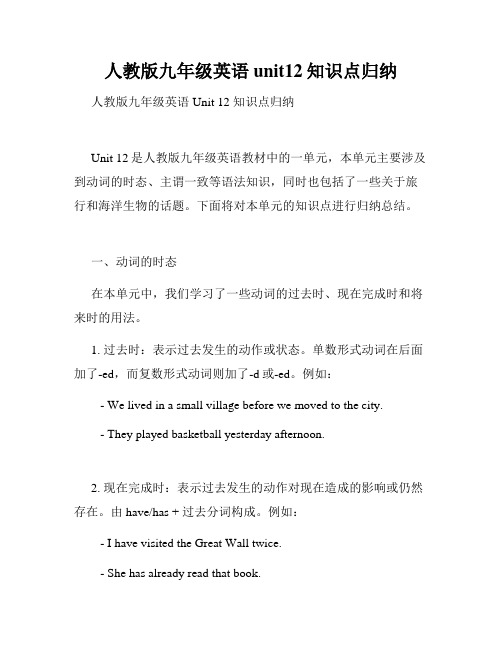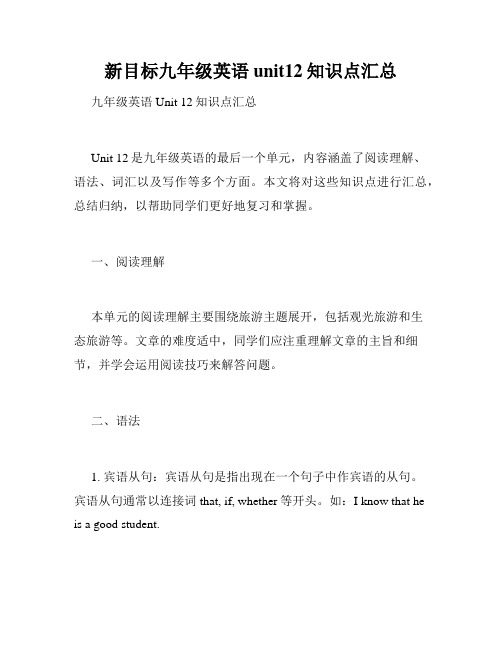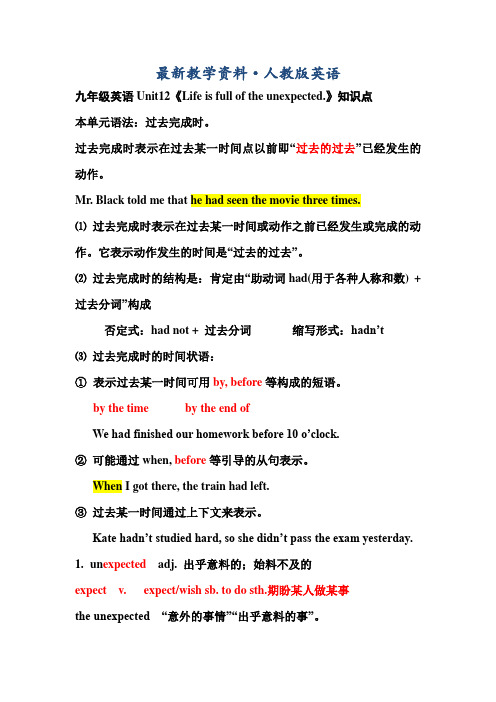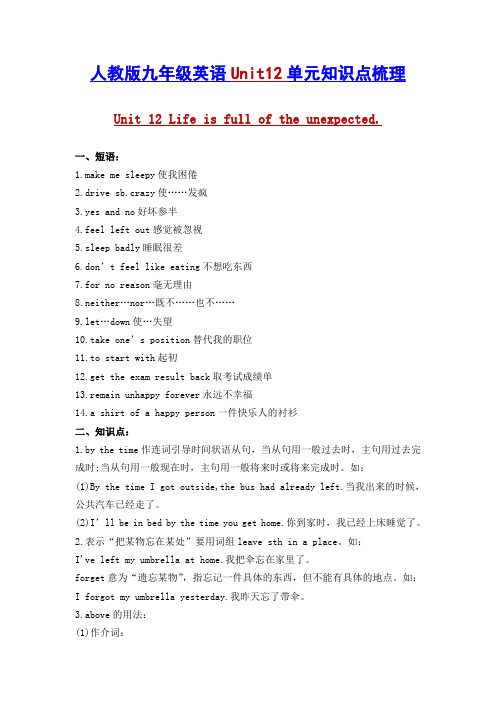人教版新目标英语九年级 Unit12单元知识点小结
人教版九年级英语unit12知识点归纳

人教版九年级英语unit12知识点归纳人教版九年级英语Unit 12 知识点归纳Unit 12是人教版九年级英语教材中的一单元,本单元主要涉及到动词的时态、主谓一致等语法知识,同时也包括了一些关于旅行和海洋生物的话题。
下面将对本单元的知识点进行归纳总结。
一、动词的时态在本单元中,我们学习了一些动词的过去时、现在完成时和将来时的用法。
1. 过去时:表示过去发生的动作或状态。
单数形式动词在后面加了-ed,而复数形式动词则加了-d或-ed。
例如:- We lived in a small village before we moved to the city.- They played basketball yesterday afternoon.2. 现在完成时:表示过去发生的动作对现在造成的影响或仍然存在。
由have/has + 过去分词构成。
例如:- I have visited the Great Wall twice.- She has already read that book.3. 将来时:表示将来要发生的动作或存在的状态。
由will + 动词原形构成。
例如:- We will go to the beach tomorrow.- They will have a party next week.二、主谓一致主谓一致是指主语和谓语在人称和数上保持一致。
在本单元中,我们需要特别注意以下几点:1. 主语为第三人称单数时,谓语动词需要加-s或-es。
例如:- He often goes to the cinema on weekends.2. 表示时间、距离、金钱等的量词作主语时,谓语动词的单复数形式与它们代表的数量有关。
例如:- Ten yuan is enough to buy a drink.三、旅行话题在本单元中,我们学习了一些与旅行相关的词汇和句型,并通过对话的形式来进行实际应用。
新目标九年级英语unit12知识点汇总

新目标九年级英语unit12知识点汇总九年级英语Unit 12知识点汇总Unit 12是九年级英语的最后一个单元,内容涵盖了阅读理解、语法、词汇以及写作等多个方面。
本文将对这些知识点进行汇总,总结归纳,以帮助同学们更好地复习和掌握。
一、阅读理解本单元的阅读理解主要围绕旅游主题展开,包括观光旅游和生态旅游等。
文章的难度适中,同学们应注重理解文章的主旨和细节,并学会运用阅读技巧来解答问题。
二、语法1. 宾语从句:宾语从句是指出现在一个句子中作宾语的从句。
宾语从句通常以连接词that, if, whether等开头。
如:I know that he is a good student.2. 将来进行时:将来进行时表示将来某个时间正在进行的动作或某个未来的事件。
构成:will be + 动词ing。
如:They will be watching a movie at this time tomorrow.3. 动词不定式的被动语态:动词不定式的被动语态由to be + 过去分词构成。
如:The problem needs to be solved.4. 特殊疑问句:特殊疑问句用来询问某个具体的信息,常见的特殊疑问词有:what, who, when, where, why, how等。
如:What time is it?三、词汇1. 旅游相关词汇:tourist, travel, destination, attraction, guide, sightseeing等。
2. 计量词:本单元涉及了一些计量词,如:a pair of, a group of,a piece of等。
在使用时要注意与名词的搭配。
3. 形容词和副词:学习一些形容词和副词可以丰富语言表达,如:breathtaking, fascinating, slightly等。
四、写作本单元的写作任务是写一篇关于英国旅游的文章。
写作时可以运用所学的词汇和语法知识,通过添加细节和论述观点来丰富文章。
【最新】【人教版】九年级新目标英语:Unit 12 知识点总结

最新教学资料·人教版英语九年级英语Unit12《Life is full of the unexpected.》知识点本单元语法:过去完成时。
过去完成时表示在过去某一时间点以前即“过去的过去”已经发生的动作。
Mr. Black told me that he had seen the movie three times.⑴过去完成时表示在过去某一时间或动作之前已经发生或完成的动作。
它表示动作发生的时间是“过去的过去”。
⑵过去完成时的结构是:肯定由“助动词had(用于各种人称和数) + 过去分词”构成否定式:had not + 过去分词缩写形式:hadn’t⑶过去完成时的时间状语:①表示过去某一时间可用by, before等构成的短语。
by the time by the end ofWe had finished our homework before 10 o’clock.②可能通过when, before等引导的从句表示。
When I got there, the train had left.③过去某一时间通过上下文来表示。
Kate hadn’t studied hard, so she didn’t pass the exam yesterday.1.un expected adj. 出乎意料的;始料不及的expect v. expect/wish sb. to do sth.期盼某人做某事the unexpected “意外的事情”“出乎意料的事”。
the +adj.表示一类人或事物。
the homeless (无家可归者) the disabled(残疾人)the wounded(战争中受伤的人) the injured(事故中受伤的人)2.by the time+时间状语从句(1)时间状语从句的时态是一般现在时时(表示将来),主句用将来完成时;(2)时间状语从句是一般过去式时,主句用过去完成时。
人教版九年级英语Unit12单元知识点梳理

一、短语:1.make me sleepy使我困倦2.drive sb.crazy使……发疯3.yes and no好坏参半4.feel left out感觉被忽视5.sleep badly睡眠很差6.don’t feel like eating不想吃东西7.for no reason毫无理由8.neither…nor…既不……也不……9.let…down使…失望10.take one’s position替代我的职位11.to start with起初12.get the exam result back取考试成绩单13.remain unhappy forever永远不幸福14.a shirt of a happy person一件快乐人的衬衫二、知识点:1.by the time作连词引导时间状语从句,当从句用一般过去时,主句用过去完成时;当从句用一般现在时,主句用一般将来时或将来完成时。
如:(1)By the time I got outside,the bus had already left.当我出来的时候,公共汽车已经走了。
(2)I’ll be in bed by the time you get home.你到家时,我已经上床睡觉了。
2.表示“把某物忘在某处”要用词组leave sth in a place。
如:I've left my umbrella at home.我把伞忘在家里了。
forget意为“遗忘某物”,指忘记一件具体的东西,但不能有具体的地点。
如:I forgot my umbrella yesterday.我昨天忘了带伞。
3.above的用法:(1)作介词:在……上面,如:The moon is above the trees now.月亮现在正位于树梢上。
‚在…之上,超过,如:They are children above six years old.他们是六岁以上的孩子。
人教版九年级英语第十二单元要点概括

人教版九年级英语第十二单元要点概括
本单元主要内容为谈论互联网对我们生活的影响。
以下是要点
概括:
词汇
1. 网络词汇:search engine, web browser, social network, online chat, online game等。
语法
1. 了解和使用连词来连接句子,如and, but, so, or等。
2. 了解和使用虚拟语气来表达假设或愿望,如If I were you, I would...等。
3. 了解并掌握宾语从句和宾语从句中的语序、时态和语气等。
阅读
1. 了解并运用阅读策略,如预测、猜词义、略读、找主题句等。
2. 通过阅读文章来提升英语阅读能力,以及了解互联网对不同
方面的影响,如社交、研究等方面。
写作
1. 能够使用文章组织框架来展开文章,如分论点展开以及给出
事例等。
2. 了解并运用过渡词和结构来连接句子和段落。
3. 通过写作来提高英语写作能力,如写一篇关于互联网对未来
生活的影响的文章。
总的来说,本单元主要目的是通过针对各项证书训练和独立思考,让学生更好地分析互联网对我们日常生活、学习和娱乐的影响,提高英语语言技能。
最新人教版九年级英语第12单元重要知识点总结大全

最新人教版九年级英语第12单元重要知识点总结大全1. 单词和短语- 否定副词:never, hardly, seldom, rarely- 名词短语:a bunch of, a series of, a variety of, a source of- 形容词短语:fed up with, worried about, interested in, tired of2. 语法2.1 过去完成时- 表示在过去某一时间或事件之前已经完成的动作或状态。
- 构成:had + 过去分词。
2.2 宾语从句- 宾语从句用来充当动词或介词的宾语,说明它所作的动作或动作的对象。
- 引导宾语从句的连词:that, whether, if, when, where, why, how 等。
2.3 名词性从句- 名词性从句可以充当主语、宾语、表语或同位语。
- 引导名词性从句的连词:that, whether, if, what, who, whom, which, whose, when, where, why, how等。
2.4 定语从句- 定语从句用来修饰一个名词或代词,并且不能独立存在。
- 引导定语从句的关系代词:that, which, who, whom, whose。
3. 文化知识- 英国文化:英国人最喜欢的体育运动是足球,也称为英式足球。
英国还有伦敦塔、巨石阵等许多著名的文化和历史遗迹。
- 美国文化:美国四个最受欢迎的体育运动是足球、篮球、棒球和冰球。
美国有百老汇和好莱坞等著名的文化产业。
4. 阅读技巧- 阅读理解题:先通读全文,找出文章主旨,然后仔细阅读每一段,根据段落大意进行答题。
- 完型填空题:通读全文,理解上下文的意思,根据句子结构和语法规律进行填空。
- 词汇题:通过上下文的句子理解和推断词义,选择正确的词汇填空。
以上是最新人教版九年级英语第12单元的重要知识点总结。
希望对你有帮助!。
人教版九年级英语第十二单元重要考点总结

人教版九年级英语第十二单元重要考点总结本文档总结了人教版九年级英语第十二单元的重要考点,以帮助学生备考。
1. 词汇与短语- 办法:method, way- 难题:difficult problem- 机械的:mechanical- 物理学:physics- 化学:chemistry- 学科:subject- 实验室:laboratory- 成绩:grade- 研究小组:study group- 选择题:multiple choice question2. 语法与句型- 宾语从句:当它作主句的宾语时,常用it作形式宾语。
例如:I find it necessary to study English every day.- 表语从句:一般用连接代词或连接副词引导。
例如:The problem is how to solve it.- 强调句型:强调主语用it is...that,强调宾语用it例如:It was Jane who won the first prize.- it is no use + 动名词:表示“做某事没有用”。
例如:It is no use crying over spilled milk.3. 句式转换和填空- 主语从句的转换例如:1) No one knows where he went. → Where he went is unknown.- 宾语从句的转换例如:1) She asked if he could help her. → She asked whether he could help her or not.2) Do you know what time it is now? → Can you tell me what time it is now?4. 阅读理解- 词义推测:根据上下文猜测单词的词义。
- 文章主旨:理解文章的中心思想。
- 细节理解:找出文章中的具体细节信息。
人教版新目标初三英语Unit 12 知识点总结

人教版新目标初三英语Unit 12 知识点总结In Unit 12 of 9th grade English。
the focus is on the past perfect tense。
This tense is used to describe an n that had already happened before a certain point in the past。
For example。
"Mr。
Black told me that he had seen the movie three times."The structure of the past perfect tense is "had + past participle." It can be used in the negative form by adding "not"after "had," or by using the n "hadn't."There are several time ns that can be used with the past perfect tense。
"By" and "before" can be used to indicate a specific time in the past。
For example。
"We had finished our homework before 10 o'clock." "When" and "before" can be used to XXX。
For example。
"When I got there。
the train had left." Finally。
- 1、下载文档前请自行甄别文档内容的完整性,平台不提供额外的编辑、内容补充、找答案等附加服务。
- 2、"仅部分预览"的文档,不可在线预览部分如存在完整性等问题,可反馈申请退款(可完整预览的文档不适用该条件!)。
- 3、如文档侵犯您的权益,请联系客服反馈,我们会尽快为您处理(人工客服工作时间:9:00-18:30)。
Unit12. Life is full of the unexpected重点短语句子重难点解析1. Life is full of the unexpected. 生活充满了意外。
be full of (= be filled with ) 充满,装满①Our life ____________________(充满)chances, but there are also a lot of challenges.②The box ____________________(装满)books.③On hearing the news, her heart was _____ gratitude (感激).A. filled ofB. full withC. filled withD. fill with2. By the time I got outside, the bus had already left. 当我到外面的时候,公共汽车已经离开了。
by the time 在……以前 (常引导表示过去的时间状语从句,主句常用过去完成时。
) By the time I got up, he had already left. 我起床时,他已经走了。
① I overslept this morning. By the time I got to the train station, the train ____________(leave ). ②By the time of last term, we ______ all the lessons.A. finishedB. have finishedC. had finishedD. will finish③____ the time I heard the noise, it had already gone. A. By B. When C. At【拓展】by now 表示“到现在为止”,通常与现在完成时连用。
By now I have collected 200 dolls.3. When I got to school, I realized I had left my backpack at home.当我到达学校时,我才意识到我把书包落在家里了。
leave sth. +地点 把某物落在某处1. by the time 在……之前2. be full of 充满3. give . . . a lift 捎(某人)一程4. go off 响铃5. rush out 冲出6. wake up 醒来wake sb. up 叫醒某人7. at least 至少;反正8. be about to do sth. 将要做某事9. go on 发生;向前走10. stare at 盯着……看11. in disbelief 怀疑地12. in line with . . . (与……)成一排13. turn into 变成14. jump out of 从……跳下 15. show up 赶到;露面 16. by the end of 在(某时间点)以前 17. get dressed 穿衣服 18. stay up 熬夜 19. April Fool's Day 愚人节 20. Costume party 化妆舞会 21. sell out 卖光 22. take place 发生 23. play jokes on sb. 和某人开玩笑 24. play a trick on sb. 捉弄某人 25. end up doing sth. 结果是(做)…;以(做)…而告终 end up with sth. 以某事结束 26. get married to 和……结婚 27. police officer 警官 28. run out of 用光;耗完①By the time I locked the door, I realized I _____ my keys at home.A. had repairedB. had changedC. had forgottenD. had left②I'm sorry. I ____ my English homework at home. -Don't forget ____ it to school tomorrow.A. left, to bringB. forgot, to takeC. lost, to bring4. My alarm clock didn't go off! 我的闹钟没有响!go off发出响声I was late today because my alarm clock didn't ____. A. run off B. go off C. give out D. give up5. Luckily, Carl's dad saw me on the street and gave me a lift in his car.幸运的是,卡尔的老爸在街上看到我,就捎了我一程。
give sb. a lift(=give sb. a ride / give a ride to sb. )捎某人一程①The poor old woman was standing in the middle of the road and asked someone to ____.A. give him a rideB. give her a rideC. enjoy a rideD. accept a ride②Tom drove by and gave me a ____ on the way home.A. flightB. RunC. walkD. lift6. I was about to go up when I decided to get a coffee first.当我正要上楼,这时我决定先去买杯咖啡。
be about to(do sth.)将要;正打算;即将;就要强调动作马上就要发生,不与具体的时间状语连用。
Hurry up, Tom! The train is _____ to start. A. about B. with C. for D. At7. I went to my favorite coffee place even though it was two blocks east from my office.我去了我最喜欢的咖啡店,虽然它在我办公室东边两个街区以外。
even though即使,虽然,尽管(用于引导让步状语从句)①I don't like vegetables ____ they are good for my health.A. becauseB. even thoughC. after allD. so that②____ Frank left school at 16, he still become a successful writer.A. Ever sinceB. In factC. After allD. Even though8. Last Friday night, my friend invited me to his birthday party.上周五晚上,我朋友邀请我参加他的生日聚会。
⑴invite sb. to do sth.邀请某人做某事①Let's call up Jim and invite ______ to play football. A. he B. him C. his⑵invite sb. to +地点邀请某人去某地②He invited a lot of friends _______________(come)to his birthday party.③She was very pleased because we invited ______ to stay with us at ______ house.A. she; weB. her; ourC. her; oursD. hers; us④Claudia, are you going to Jeff 's birthday party on Saturday?-Unless I______ .A. will be invitedB. am invitedC. was invitingD. invited⑤Tom! I looked for you everywhere at the party last night. -Oh, I _______ to the party.A. am invitedB. was invitedC. am not invitedD. wasn't invited9. After an hour, the other kids showed up...一小时后,其他的孩子们都来了...show up赶到;露面;出席★常见带show的短语on show(= on display)展出;表演show off炫耀;卖弄)show sb. around带某人四处参观/看看show sb. sth.(=show sth. to sb.)给某人看某物①He didn't show _______ until the meeting was over. A. on B. out C. in D. up②-It's everyone's duty to join the Clean Your Plate Campaign.-Sure. We should try to _____ all the food that we've ordered.A. give upB. eat upC. turn upD. show up③I used to _______ with my wife and watch TV movies at home.A. show upB. wake upC. come upD. stay up④His works are _____________ in the library today. 他的作品今天在图书馆展出。
⑤ __________________________ is very boring. 正放映的那部电影非常枯燥。
